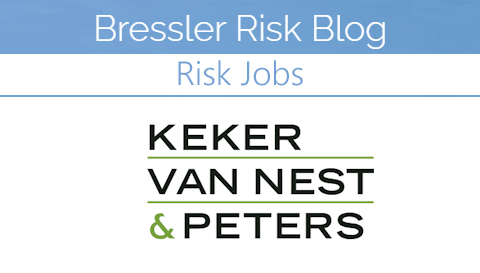Risk Reading — Corporates and Conflicts, Vax Panel Conflicts, Union Clashes with State DA Over Outside Counsel,
Posted on
David Kluft notes: “Can I be adverse to my own client in a lawsuit if they don’t contest liability?” —
- “A VA attorney appeared in a contract action for a Father against his Son and the Son’s Wife. Three days later, he appeared for the Son in a divorce matter against the Wife. There was no informed consent.”
- “He argued that this was not a conflict because the Son never contested the debt to the Father. The lawyer moved for a default in the contract action against the Son (his own client) and the Wife. The wife had moved away by then so she wasn’t properly served with the Father’s complaint or the default motion, but the attorney falsely told the court she had been served.”
- “License revoked for the conflict, the false statement to the court, and other misconduct.”
- The order: here.
Three Skadden lawyers write on: “Navigating the maze of conflict of interest laws for corporate employees taking government roles” —
- “It has been hard to miss the headlines in recent months involving a number of high-profile, high-net worth individuals taking senior positions in the federal government. There have always been wealthy individuals who go into the government, but the sheer number of such appointees and also ultra-wealthy business owners being appointed are testing the conflict of interest laws.”
- “These laws attempt to prevent self-dealing and preserve the objectivity of public officials. However, what often goes overlooked are the significant impacts they can have on not only the appointees but also the companies at which they work (or in which the appointees have significant ownership interests).”
- “For an appointee’s company, the challenges extend far beyond the headlines and into the realm of operational, legal, and reputational risk, as the obligations imposed by conflict of interest statutes can create unexpected complications for businesses whose employees seek or hold public office at the federal, state, or local level. Understanding and navigating these risks is essential not only for the individuals involved, but also for the organizations that may find themselves dealing with new restrictions, disclosure requirements or even prohibitions on doing business with government entities as a result of an employee’s public service.”
Federal disclosure, recusal and divestment requirements” - “At the federal level, the primary conflict consideration is the prohibition, contained in 18 U.S.C. § 208, on federal officials participating in decisions (even broad policy decisions) that can affect companies or businesses in which they have financial interests. In addition, Office of Government Ethics rule 5 CFR § 2635.502 covers not only companies in which an official currently has a financial interest but also any company that employed or retained the official during the one-year period before joining the government. However, this rule requires recusal merely from matters where the company is an actual party, as opposed to broad policy decisions.”
- “These prohibitions underpin requirements that incoming officials disclose their financial interests (publicly for senior officials) going back a full calendar year before joining the government, agree to recuse themselves from matters that impact those interests and, where recusal is not feasible given the responsibilities of their office, divest holdings that conflict with those responsibilities. The premise is simple enough, but these requirements can present daunting and unanticipated challenges for both the incoming officials and, in some cases, their employers.”
- “Disclosure forms require not just a list of holdings but the official must assign them a value as well, which can be unwelcome news for the official’s employer if that would result in disclosing sensitive information regarding employment-related assets. For example, this can be particularly problematic for those coming from a private equity background with significant holdings in PE funds and related carried interest vehicles, which are notoriously difficult to value.”
- “Moreover, in many cases the law may require identifying a fund’s underlying holdings, information which is commonly viewed as proprietary and protected by confidentiality agreements. As for the recusal requirement, agreeing to divest from these interests may be the only resolution, but even that step can be challenging if the assets are illiquid.”
- “It can also impose significant costs on the official who may be forced to sell quickly or at an inopportune time. For example, having to suddenly divest a significant ownership interest in a closed-end private equity fund could be a dealbreaker given the difficulty of quickly identifying a qualified buyer acceptable to the fund sponsor. It is generally advisable for potential appointees – even if they do not fall into the ‘ultra-wealthy’ category – to work with the relevant ethics officials early in the process to determine what they may need to sell off in order to determine whether accepting their appointment is financially feasible.”
- “While most of the media attention focuses on federal officials, similar conflict of interest laws exist at the state and local level. Every state has its own rules governing the conduct of public officials, as do many cities, towns and counties — and in many cases, they can be even more stringent than the federal rules with more consequences for an official’s private employer.”
- “Moreover, given that these laws tend to apply broadly to most, if not all, elected and appointed positions in a given state or locality — including, for example, school boards, town councils and zoning commissions — from a company’s perspective, it is far more common to have employees seeking state or local positions that can trigger these consequences than employees entering federal office.”
- “While these laws can present similar disclosure, divestment, and recusal considerations as the federal regime does, many state and local conflict laws impose restrictions well beyond requiring an official to recuse from certain matters. These restrictions can create real risk for a company, particularly when an employee intends to keep their job and serve as a part-time state or local official. For example, in some jurisdictions, an employee may be prohibited from appearing on behalf of his or her employer before not just their own agency, but any agency within their jurisdiction. If the employee’s job duties include regularly interacting with the government, such a restriction may be unworkable.”
- “State and local laws also may bar an official from sharing in any profits generated from government contracts, even if they had no involvement in negotiating or approving the contract in question while wearing their government ‘hat.’ Successfully navigating these types of restrictions could require imposing special compensation arrangements and/or limitations on the employee’s involvement with the work being done under government contracts.”
- “Most importantly, under the strictest laws, the company could face an absolute prohibition against maintaining or entering into new government contracts with the employee’s agency — or even other agencies in the same jurisdiction — regardless of whether the employee has any involvement in the process. For example, California Government Code § 1090 generally prohibits an agency from entering into a contract with a company that employs a member of the agency’s board, even if the employee recuses entirely from the agency’s contract discussions and approval process.”
- “Given the significant risks highlighted above, it is essential for companies to maintain a policy requiring employees to obtain prior approval before seeking or accepting any government position — no matter how minor it may seem. This requirement allows a company to properly vet those requests to protect the company from unforeseen consequences, both legal and reputational.”
- “A particular concern when faced with this dilemma is the fact that many states have labor laws that limit an employer’s ability to restrict the outside activities of its employees, and some specifically protect employees’ rights to serve in public office or participate in political activities. Such laws must be taken into consideration when evaluating potential restrictions or requirements to impose on an employee as a result of conflict laws.”
“Member of RFK Jr’s new vaccine panel withdraws over conflict of interest” —
- “A member of the health secretary Robert F Kennedy Jr’s newly overhauled federal vaccine advisory panel withdrew after a conflict of interest review, a spokesperson has told the Guardian. Dr Michael Ross, who was involved in multiple private healthcare companies, withdrew after review of his financial holdings.”
- “Kennedy unilaterally fired all 17 members of the Centers for Disease Control and Prevention’s (CDC) advisory committee on immunization practices (ACIP) in June, arguing they had too many conflicts of interest.”
- “Ross was among eight of Kennedy’s ideological allies appointed to the committee, after the secretary argued the old members of the committee were subject to too many conflicts of interest.”
- “‘Yesterday, Dr Michael Ross decided to withdraw from serving on ACIP during the financial holdings review,’ a spokesperson for the Department of Health and Human Services (HHS) said.”
- “The spokesperson made the comments after Guardian inquiries about conflict of interest disclosures for new members of ACIP. Although the Trump administration and Kennedy developed a conflict of interest tracker specifically for ACIP members, Kennedy’s appointees have not been added.”
- “The new members of the committee were asked to disclose conflicts of interest before the meeting began on Wednesday. The committee chair Dr Martin Kulldorff and committee member Dr Robert Malone omitted widely reported work in vaccine litigation, and nurse Vicky Pebsworth said she was ‘asked to read’ a statement disclosed ownership of a healthcare stock but said it was below the government ethics office threshold for reporting.”
The conflicts tracker itself is fascinating, and is accessible here: “Conflicts of Interest Disclosures of ACIP Members”
“California AG is sued by his office’s lawyers for outsourcing climate case” —
- “California Attorney General Rob Bonta’s decision to hire an outside law firm to handle a high-profile climate lawsuit has drawn its own legal challenge — from lawyers in his office.”
- “The labor union that represents attorneys in Bonta’s office has filed a lawsuit in Sacramento County Superior Court, saying the California State Personnel Board wrongfully sided with Bonta (D) who enlisted the law firm Lieff Cabraser Heimann & Bernstein in the state’s lawsuit against some of the world’s largest oil companies.”
- “The union — California Attorneys, Administrative Law Judges and Hearing Officers in State Employment (CASE) — argued that hiring outside lawyers violates state law and is dispiriting for the 1,100 attorneys on staff. The climate lawsuit, the union said, ‘are the kinds of cases that attract attorneys to come to work for the state in the first place.'”
- “‘To go hire a high-end law firm, as interesting as the litigation might be, it’s a run-of-the-mill, garden variety legal theory,’ CASE president Timothy O’Connor said in an interview. ‘Why they would need to go out to $1,600-an-hour attorneys for work that we feel is completely within the expertise of our very good and dedicated civil service attorneys is beyond me.'”
- “In court filings, the union said hiring an outside firm ‘deprives civil service attorneys of once-in-a-career opportunities’ and reduces ‘the few incentives that currently exist to entice young attorneys to come to work for the state.'”
- “‘Illegally outsourcing this work will do incalculable damage to the state’s legal workforce,’ the petition states, adding that it would ‘ironically lead to a greater need to outsource more legal work in the future due to a lack of expertise and experience that could be gained on a case like this.’ Bonta should have made certain he had the resources and staff to prosecute the case before it was filed, the union said.”
- “Bonta’s office said in court documents that although it has assigned five lawyers from the office to the case, its attorneys ‘lack sufficient experience and expertise in litigating such a massive lawsuit against an entire industry with nearly limitless legal resources at its disposal.'”
- “In a letter to the union, Bonta’s office called the lawsuit ‘one of the largest, most high-profile, and most significant cases the Department of Justice has ever litigated.’ If the climate cases are successful, the oil industry could be forced to pay hundreds of billions of dollars for harming the public — like tobacco and opioid manufacturers before it.”
- “Judge Shelleyanne Chang has scheduled a hearing in the case for June 27.”
- [UPDATE: At this hearing, the judge issued a tentative ruling rejecting the petition.]









